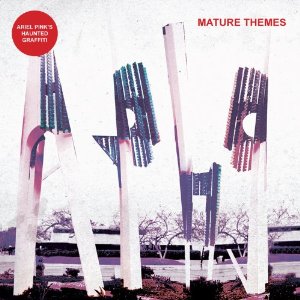Early 90s lo-fi was, by and large, a creed by which making music was a free choice, an expression of a decision not to participate in the acquisitive rat-race the 80s had set in motion and to which a cultivated air of unprofessionalism offered some form of rebuke. The autobiography of hypnagogic pop, slacker music’s descendent at least in terms of recording values, might be said to be almost the diametric opposite of this: its narrative is one of compulsion, of being possessed by sound encountered in early life which insists on using the performer’s body as a conduit for its repetition. In this tale, the artist’s agency is envisaged as limited, with music presented as an irresistible, occult force.
There’s a lot to like in such a notion but, just as slacker-band mythologies tended to conceal trust-funded conditions of artistic production, hypnagogic’s rhetoric of enslavement to the music isn’t entirely sound. Ariel Pink has form when it comes to talking about, well, not being able to help himself, and one has to wonder if aspects of his interview patter spring from a desire to imbue his work with the weight of inevitability or necessity. However, Mature Themes, his properly-recorded new album and his second for 4AD, may well mark the point at which Pink achieves an audience wider than the critical faction for whom his creative process has justified some pretty underwhelming music. It’s worth speculating as to what this record will sound like to those uninterested in the kinds of cultural theorising which have accompanied – or, more aptly, acted as the necessary complement to – previous releases.
The songs on Mature Themes aren’t connected by a style and, unequipped with prior awareness of the discussion around hypnagogic pop and hauntology, would probably sound as frustratingly incompatible with each other as those on Beck’s most distracted efforts. Pink’s hand turns to everything: the Farfisa-propelled opener ‘Kinski Assassin’ sounds exactly like Beat Happening; ‘Early Birds of Babylon’ is a Cult-like play at spooky; ‘Baby’ is a self-consciously erotic piece of Philly soul. If you’re not in on the joke, these things simply don’t follow. That’s not to say, though, that there is nothing holding the album together. The glue is a certain, almost ineffable, texture of analogue wheeze which gives the sense that every song is struggling into the temporal distance.
Critics have tended to ascribe the depleted, blurred aspect of Pink’s aesthetic to a need to provide a tactile demonstration of the way in which sound decays across periods of time. One could think of it differently, though – as the effect of something struggling to keep on being heard, as a sonics of effort which might be read as another claim for the inevitability of outmoded forms which are locked in a struggle with the contemporary. Again, then, the music is forcing itself on the artist and making him an instrument of its will. In an interview with this site a few years ago, Pink spoke of finding therapy liberating: "I realised it wasn’t all me, it was them", he said, referring to his parents. Mature Themes is dominated by a similar conceit. He’s not the postmodern artist playing excitedly with the fragments of history, but the vaguely resistant body through which those fragments, after a brief fight, go on living.
Instead of nodding along to the argument that the music here seems to be making, one might instead point out that it seems somewhat deterministic. This seems more urgent when it becomes clear that Pink is using his lyrics to make statements about other forms of behaviour being the fault of culture, rather than the individual. ‘Symphony of the Nymph’ is particularly guilty of this: "I don’t want to burn any bridges / but I can’t get enough of those bitches / I’m just a rock ‘n’ rolla from Beverley Hills…". Now, no doubt someone will be along soon to say that this is a ‘deconstruction’ of a specific strand of West Coast rock mythology, but I’d venture that it’s precisely not that. As far as Pink’s concerned, he’s being made to do it – let the music in, become a "rock ‘n’ rolla", and you no longer have any say in your own behaviour, let alone the faculties necessary to achieve ironic distance from misogynistic idiocy like this.
In addition to all this, several songs on Mature Themes – particularly the annoying ‘Is This The Best Spot’ – draw heavily on the musical template of TV advertising, another thing that is supposed to be irresistible. Those who have portrayed Pink as an inspired explorer of the relationship between memory and the more crass aspects of popular culture have at times written very convincingly, and almost always enjoyably, invariably giving more pleasure than the records. But there’s a difference between subtly investigating how one’s mind becomes occupied by trash and prostrating oneself before that trash and its implied values, and Pink errs increasingly towards the latter. Ultimately, this is a celebration, rather than an analysis, of several species of awfulness.


